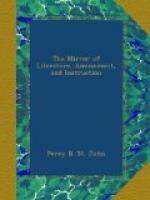SPIRIT OF THE PUBLIC JOURNALS.
THE DEVIL’S SONATA.
Tartini’s compositions are very numerous, consisting of above a hundred sonatas, and as many concertos. Among them is the famous “Sonata del Diavolo,” of the origin of which Tartini himself gave the following account to the celebrated astronomer Lalande:—
“One night, in the year 1713, I dreamed that I had made a compact with his Satanic Majesty, by which he was received into my service. Everything succeeded to the utmost of my desires, and my every wish was anticipated by my new domestic. I thought that, on taking up my violin to practise, I jocosely asked him if he could play on this instrument? He answered, that he believed he was able to pick out a tune; when, to my astonishment, he began a sonata, so strange, and yet so beautiful, and executed in so masterly a manner, that in the whole course of my life I had never heard anything so exquisite. So great was my amazement that I could scarcely breathe. Awakened by the violence of my feelings, I instantly seized my violin, in the hope of being able to catch some part of the ravishing melody which I had just heard, but all in vain. The piece which I composed according to my scattered recollections is, it is true, the best I ever produced. I have entitled it ‘Sonata del Diavolo;’ but it is so far inferior to that which had made so forcible an impression on me, that I should have dashed my violin into a thousand pieces, and given up music for ever in despair, had it been possible to deprive myself of the enjoyments which I receive from it.”
Time, and the still more surprising flights of more modern performers, have deprived this famous sonata of anything diabolical which it may once have appeared to possess; but it has great fire and originality, and contains difficulties of no trifling magnitude, even at the present day. That process of mind, by which we sometimes hear in sleep a beautiful piece of music, an eloquent discourse, or a fine poem, seems one of those mysterious things which show how fearfully and wonderfully we are made. It would appear that there are times when the soul, in that partial disunion between it and the body which takes place during sleep, and when it sees, hears, and acts, without the intervention of the bodily organs, exerts powers of which at other times its material trammels render it incapable.—What powers may it not exert when the disunion shall be total!
(From an interesting paper on “the Violin,” in the Metropolitan.)
* * * * *




